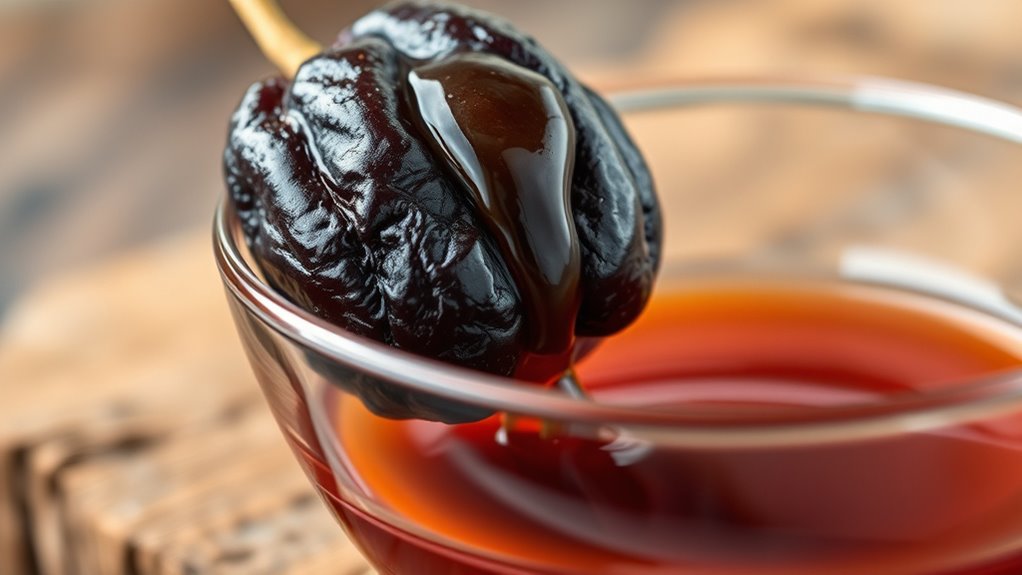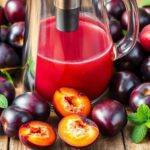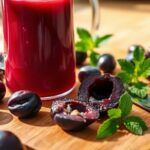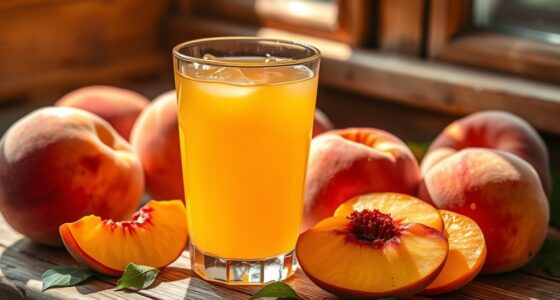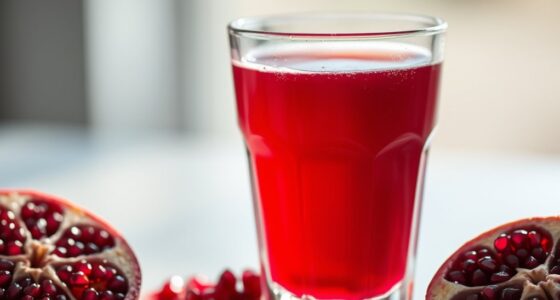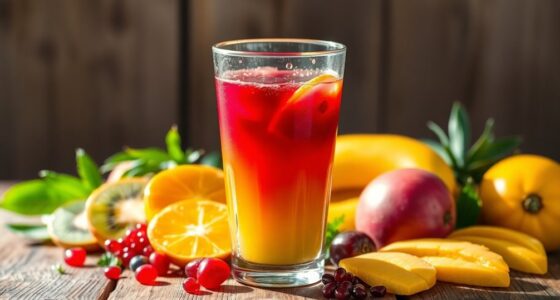To make prune juice from dried plums, you extract the liquid by soaking and blending the dried fruit to release its natural sugars, antioxidants, and nutrients. The process involves rehydrating the plums, then straining or blending them to produce a smooth, flavorful juice packed with fiber, vitamins, and minerals. High-quality prune juice retains more health benefits and should be free of added sugars. Continue exploring to learn more about its extraction methods and benefits.
Key Takeaways
- Prune juice is extracted from dried plums through pressing or blending to release their natural juices.
- The process involves rehydrating dried plums or using fresh plums to maximize juice yield.
- Extraction preserves nutrients such as vitamins A, K, and antioxidants found in dried plums.
- Minimal processing ensures the juice retains the natural fiber and laxative properties of dried plums.
- Commercial prune juice production often involves filtration and pasteurization to ensure safety and quality.
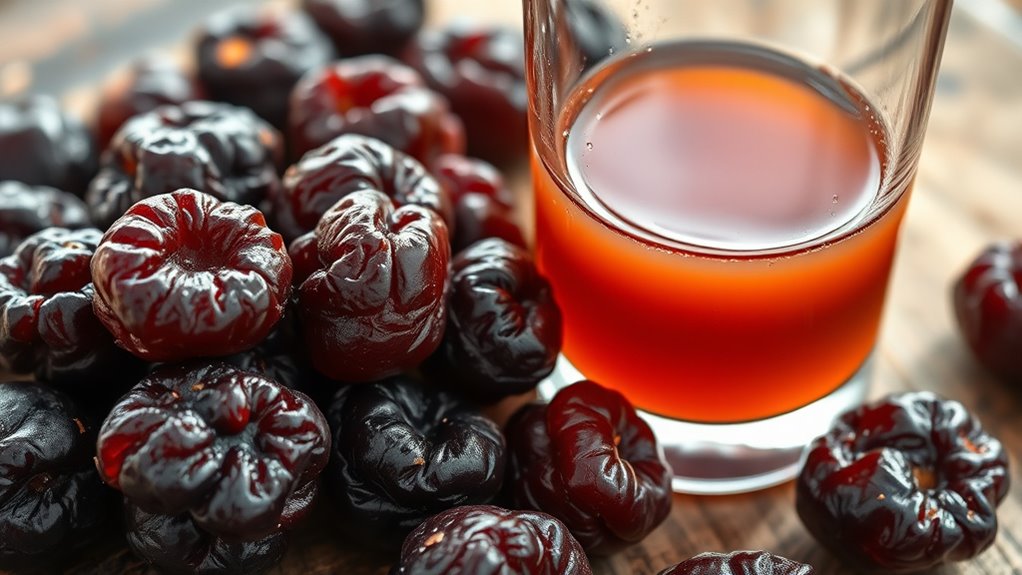
Prune juice is a popular natural remedy known for its ability to support regular digestion. When you drink it, you’re not just benefiting from its soothing effects on your gut; you’re also taking in a significant amount of fiber content that promotes healthy bowel movements. The fiber in prune juice helps add bulk to your stool, making it easier to pass and reducing the chances of constipation. This natural laxative effect is why many people turn to prune juice when they’re looking for a gentle, effective way to keep their digestive system running smoothly. Additionally, the fiber content in prune juice contributes to overall health by aiding in weight management, controlling blood sugar levels, and supporting heart health. As you incorporate prune juice into your routine, you’re also reaping these nutritional benefits, which make it a smart choice for maintaining wellness.
The nutritional benefits of prune juice extend beyond fiber. It’s rich in vitamins and minerals such as vitamin K, vitamin A, potassium, and antioxidants. These nutrients support various bodily functions, from promoting healthy vision and strong bones to regulating blood pressure and reducing inflammation. Drinking prune juice can give your immune system a boost and help your body recover from oxidative stress thanks to its antioxidant properties. additionally, prune juice contains sorbitol, a natural sugar alcohol that contributes to its laxative effects while providing a low-calorie sweetener option. This makes it suitable for those seeking a nutritious alternative to processed sweets or sugary drinks. The combination of fiber, vitamins, minerals, and antioxidants makes prune juice not only a tasty beverage but also a nutrient-dense addition to your diet.
When you choose high-quality prune juice, you’re ensuring that you’re getting the full spectrum of its health benefits. Look for options that are 100% pure, without added sugars or preservatives, to maximize the nutritional benefits. Freshly extracted prune juice retains more of the natural nutrients than heavily processed versions, so it’s worth investing in good quality products. Incorporating a glass of prune juice into your daily routine can help you maintain regularity and provide your body with essential nutrients that support overall health. Whether you drink it in the morning or as part of your evening routine, prune juice offers a natural, wholesome way to enhance your digestive health while nourishing your body with essential nutrients.
Frequently Asked Questions
Can Prune Juice Be Made at Home Easily?
Yes, you can make prune juice at home easily with DIY preparation. Simply soak dried plums in water overnight, then blend them until smooth. Strain the mixture to remove solids, and you’ll have fresh, nutritious prune juice. This homemade version preserves the nutritional benefits like fiber and antioxidants, making it a healthy beverage option. Plus, it’s cost-effective and free from added preservatives or sugars.
How Long Does Homemade Prune Juice Last?
Homemade prune juice typically lasts about 3 to 5 days in the fridge. To extend its shelf life, you should store it in an airtight container and keep it refrigerated at all times. Preservation techniques like pasteurization or adding natural preservatives can help, but refrigeration remains the simplest way to maintain freshness and prevent spoilage. Always check for signs of fermentation or mold before consuming.
Are There Any Risks of Overconsumption?
Like Pandora’s box, overdoing prune juice can open up health risks. Consuming too much may lead to diarrhea, stomach cramps, or dehydration. To avoid these issues, stick to moderate consumption limits. Your body’s signals are your best guide—if you notice discomfort, cut back. Remember, even natural remedies can turn into trouble if you ignore your limits, so enjoy prune juice wisely and in moderation.
What Are the Best Storage Methods for Dried Plums?
You should store dried plums in an airtight storage container to maintain freshness. Keep them in a cool, dark place like a pantry or cupboard to extend their shelf life. Avoid exposure to sunlight and humidity, which can spoil the fruit faster. For longer storage, consider refrigerating or freezing dried plums. Proper storage helps preserve flavor, texture, and nutritional value, ensuring you get the best quality whenever you enjoy them.
Is Prune Juice Suitable for Children?
Did you know that prune juice is often recommended in pediatric nutrition for relieving constipation? It’s generally suitable for children, but you should be cautious about allergen concerns, especially if your child has known fruit allergies. Always introduce it gradually and consult your pediatrician. Prune juice offers beneficial nutrients, but moderation is key to avoid potential digestive discomfort or allergic reactions.
Conclusion
Now that you know how prune juice is made from dried plums, remember it’s both a natural remedy and a delicious drink. While it offers digestive benefits, it’s also a sweet, tangy treat that can brighten your day. The surprising thing? It’s simple to make at home, yet packed with nutrition. So, whether you seek wellness or flavor, prune juice proves that sometimes, the most humble ingredients deliver the biggest benefits.
Cindy thoroughly researches juicing trends, techniques, and recipes to provide readers with practical advice and inspiration. Her writing style is accessible, engaging, and designed to make complex concepts easy to understand. Cindy’s dedication to promoting the advantages of juicing shines through her work, empowering readers to make positive changes in their lives through the simple act of juicing.

